Nurses Narratives Sister Georgina Collins
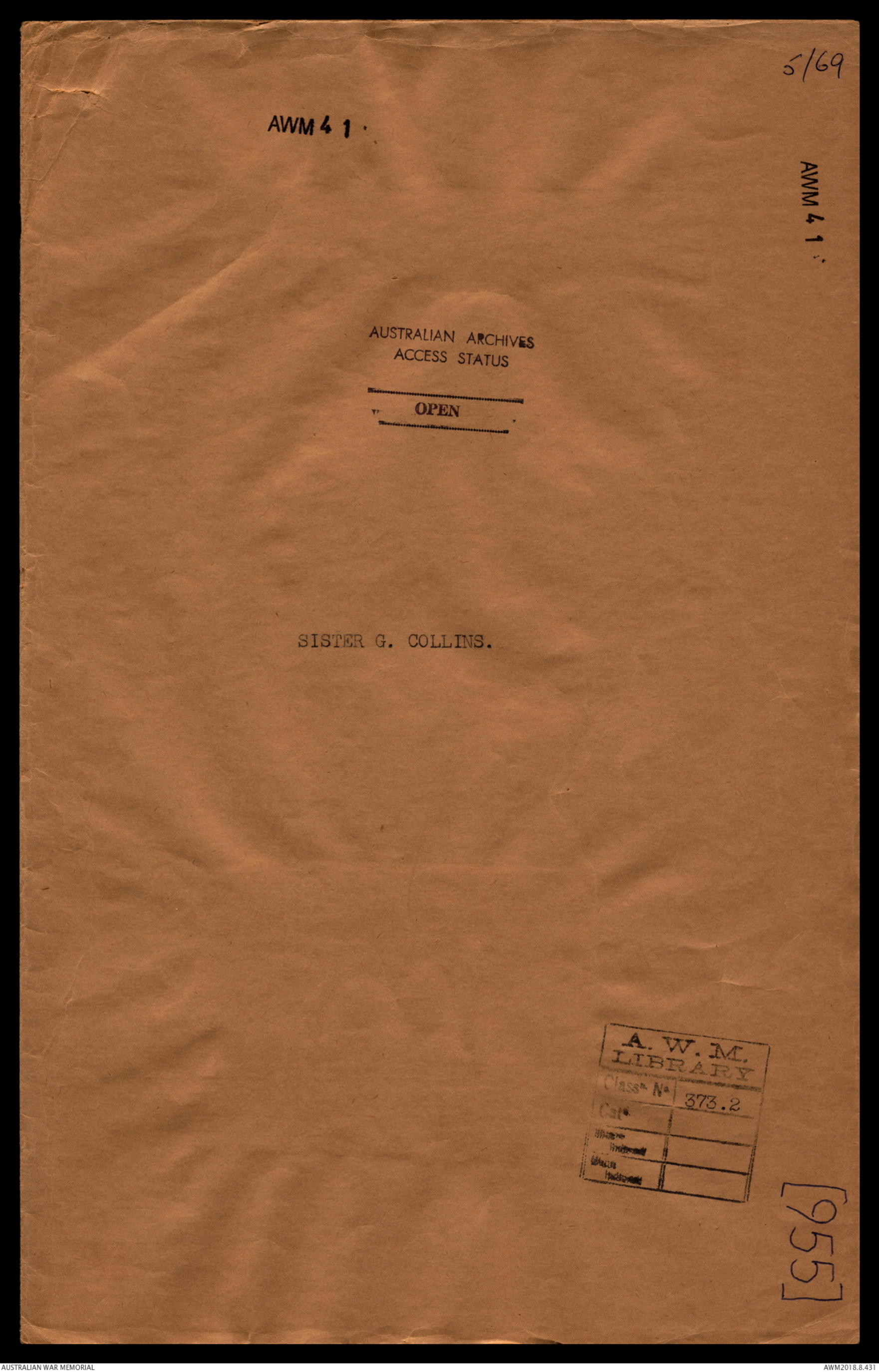
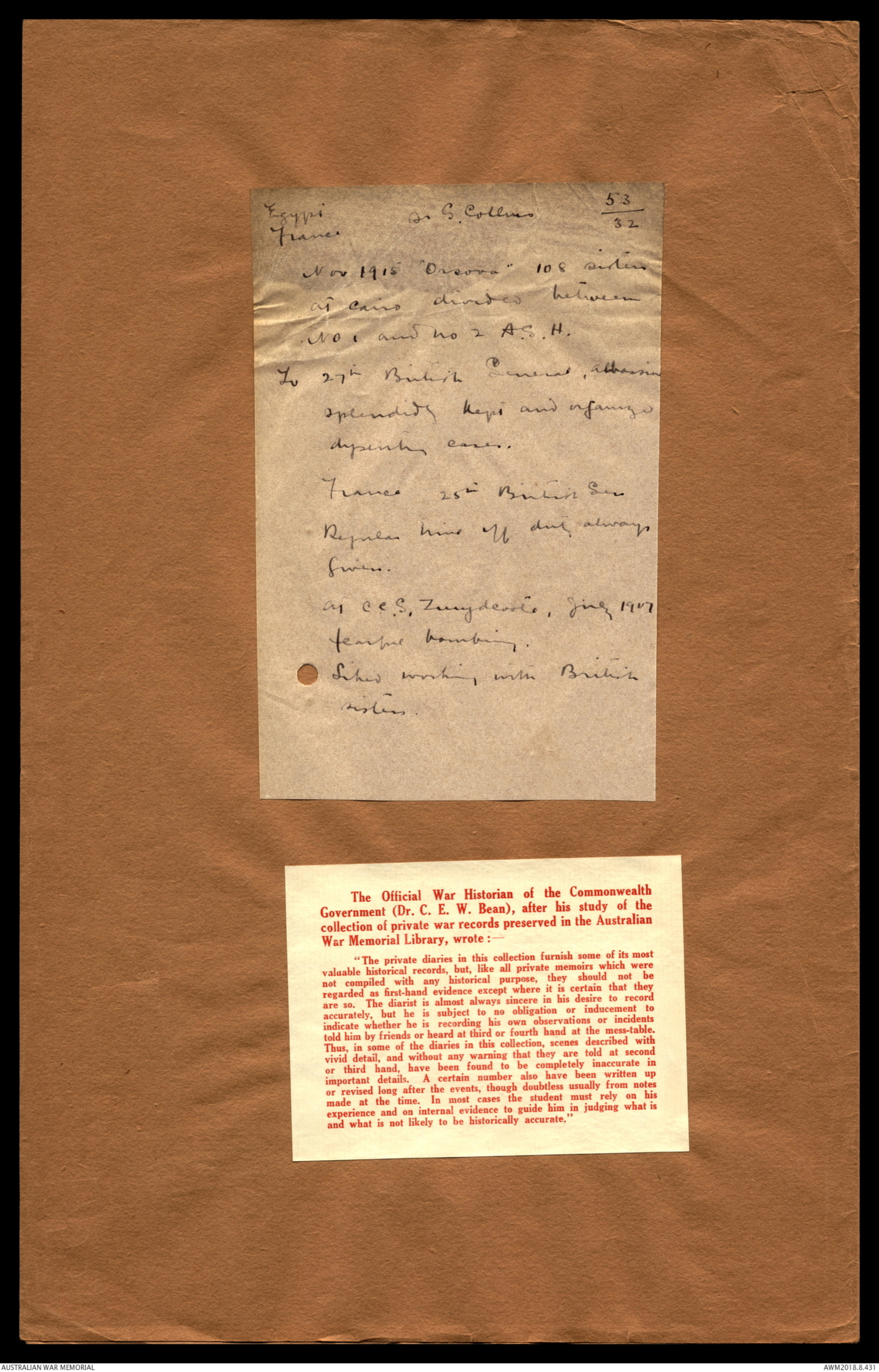
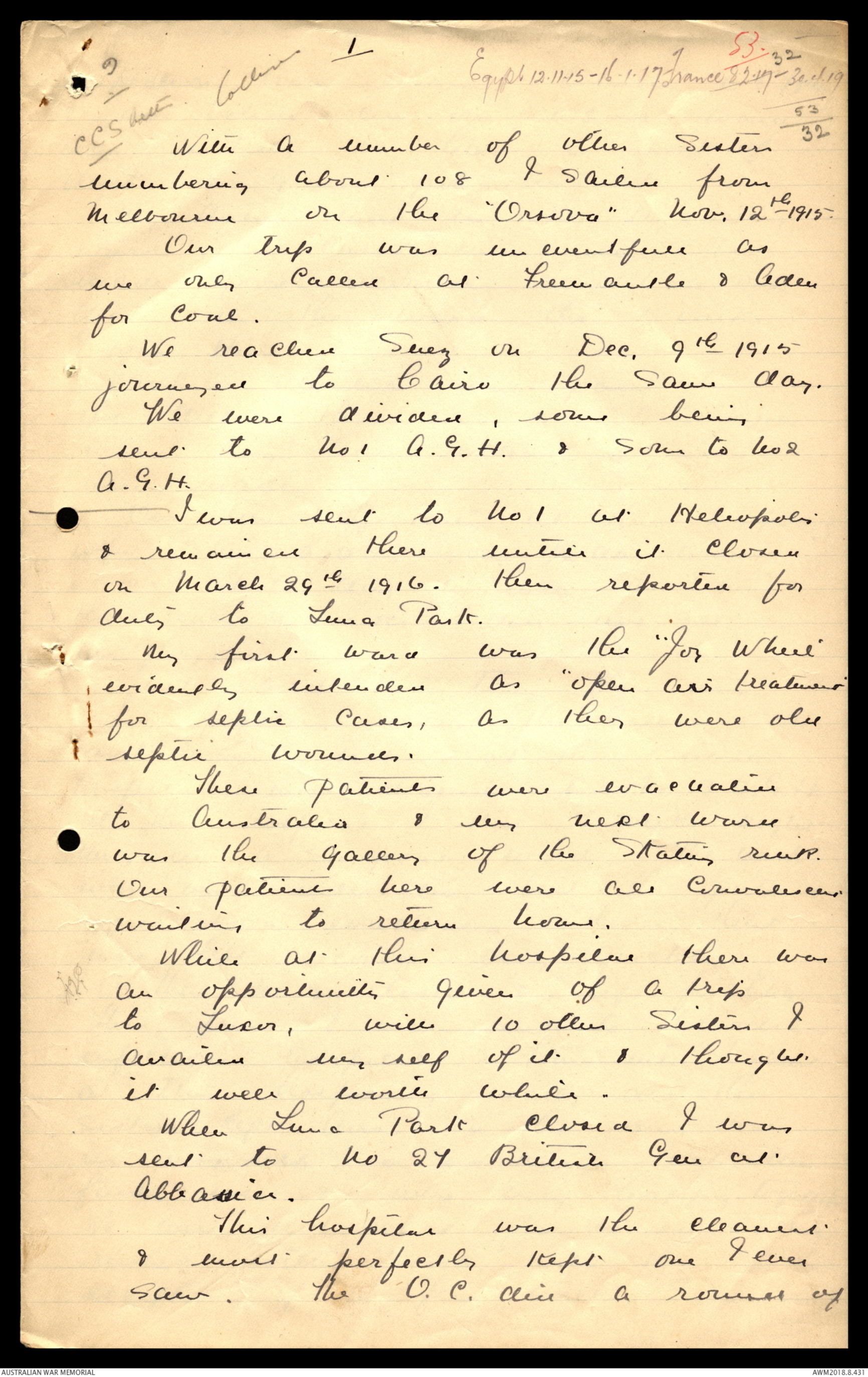
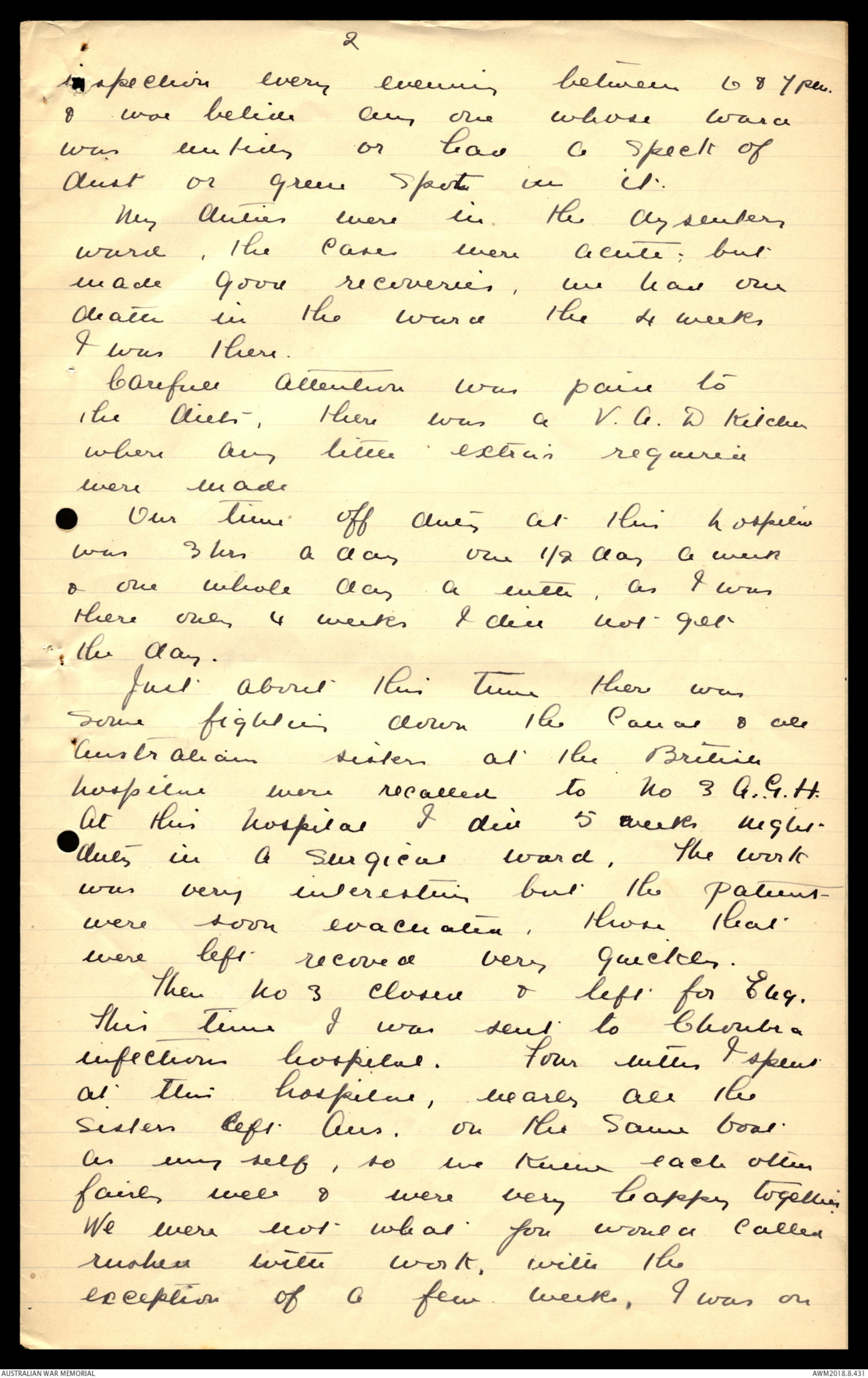
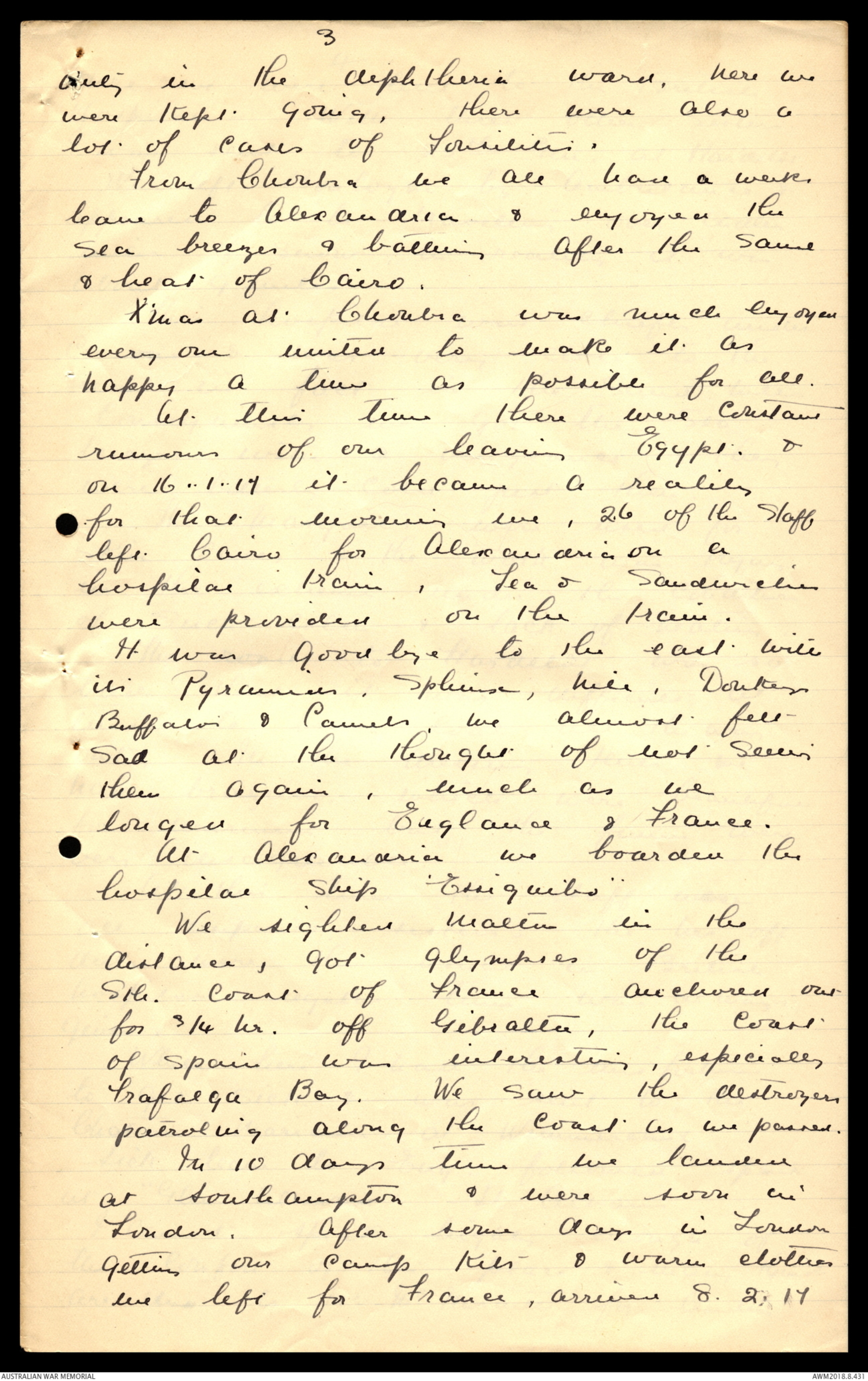
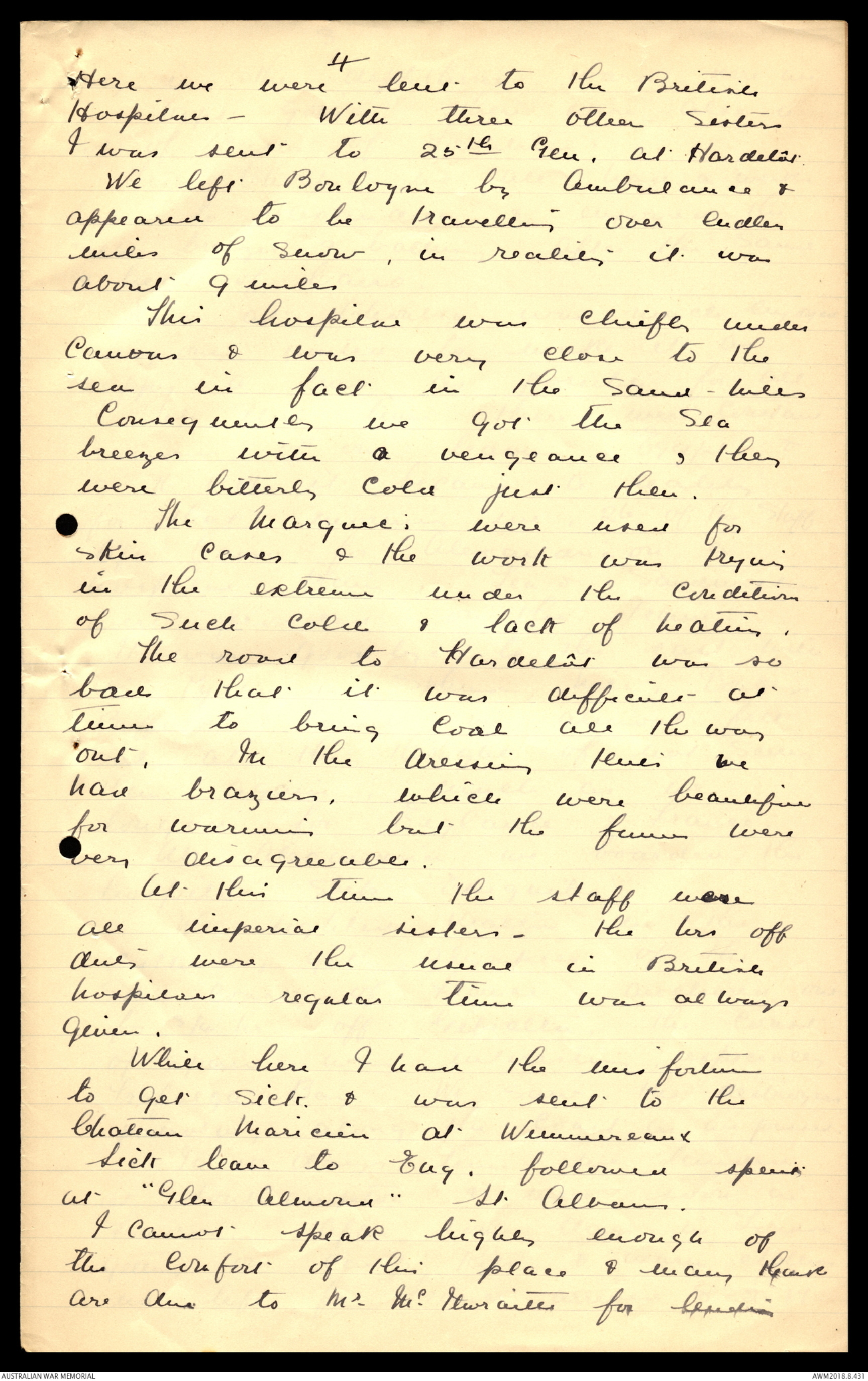
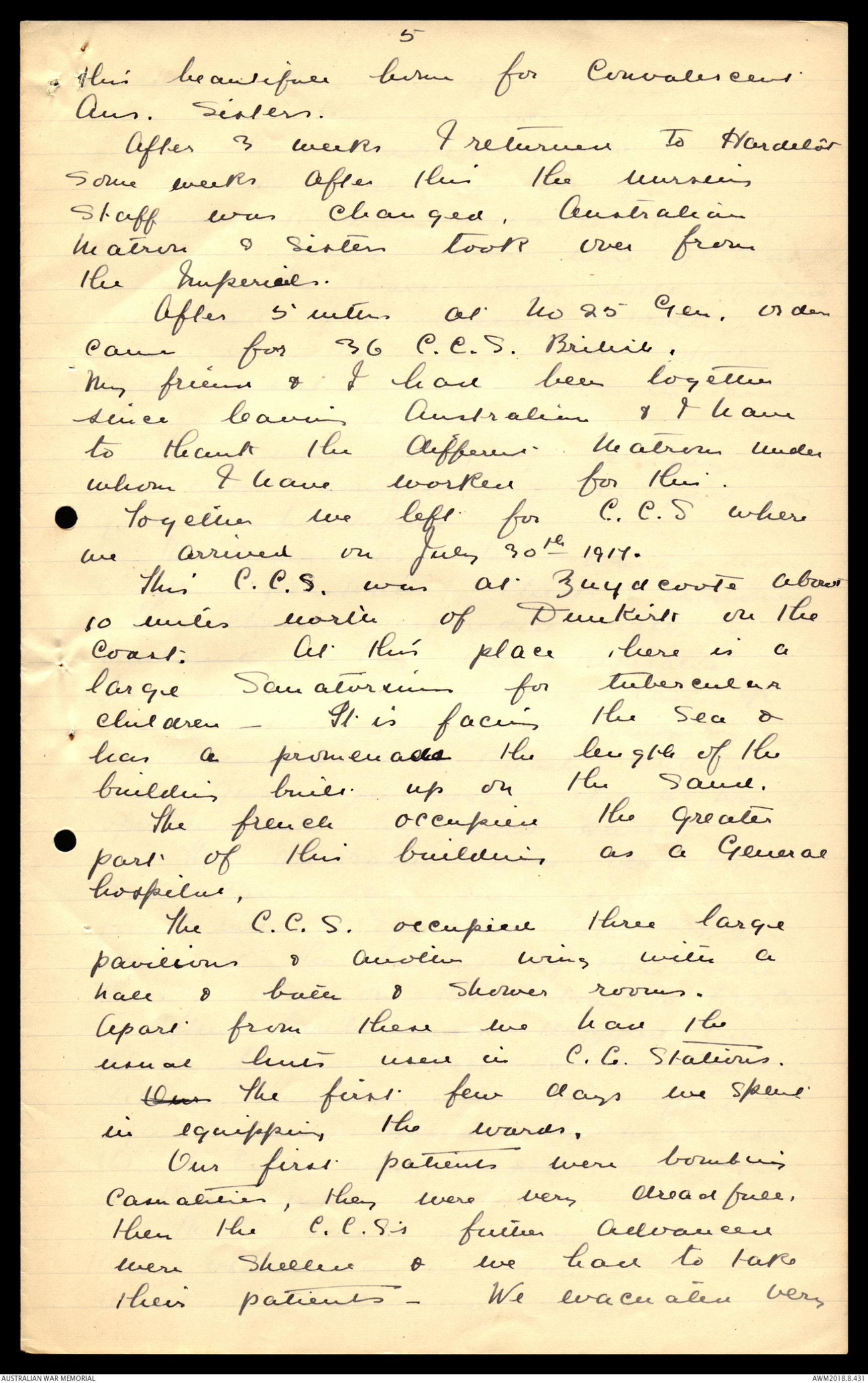
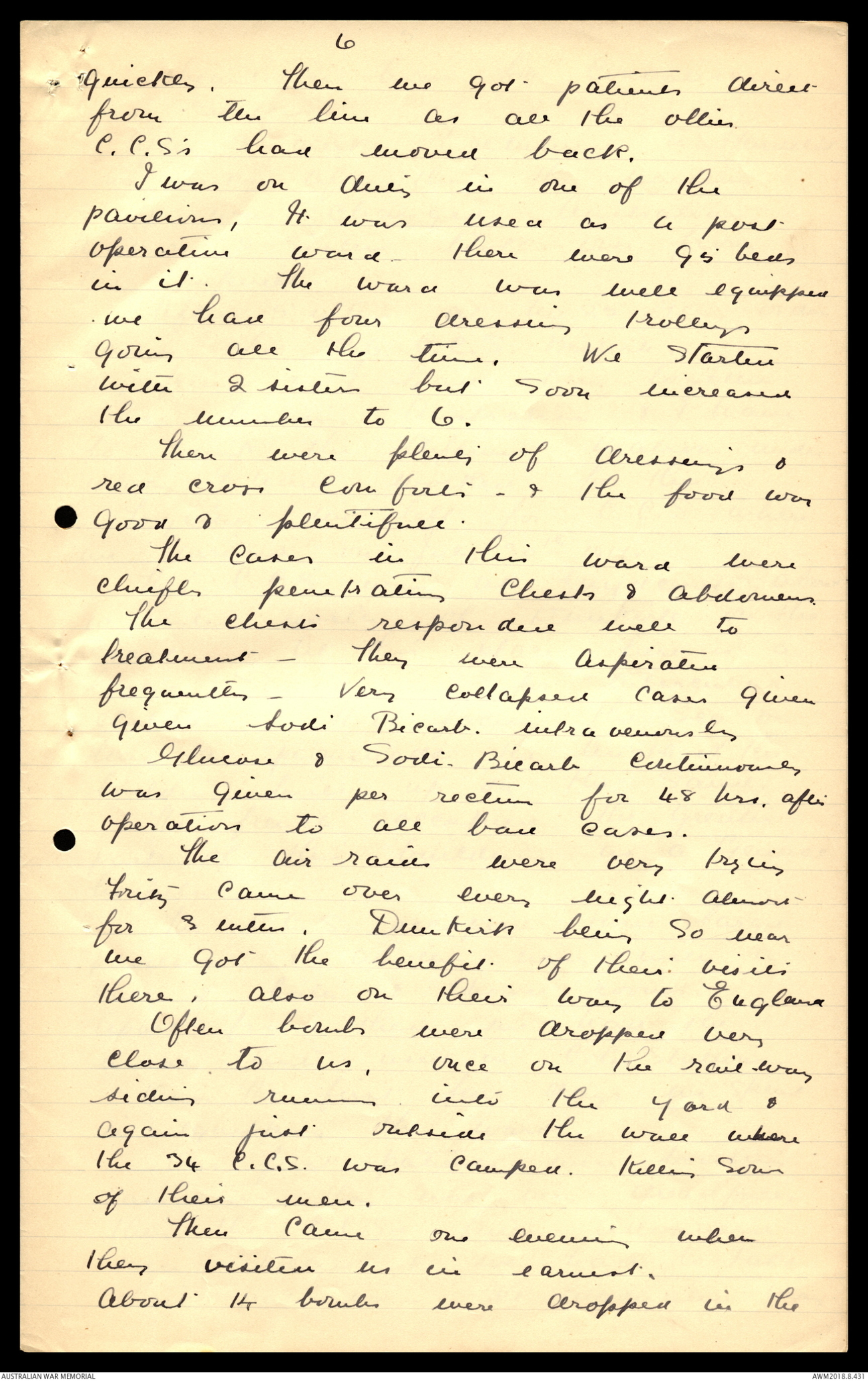
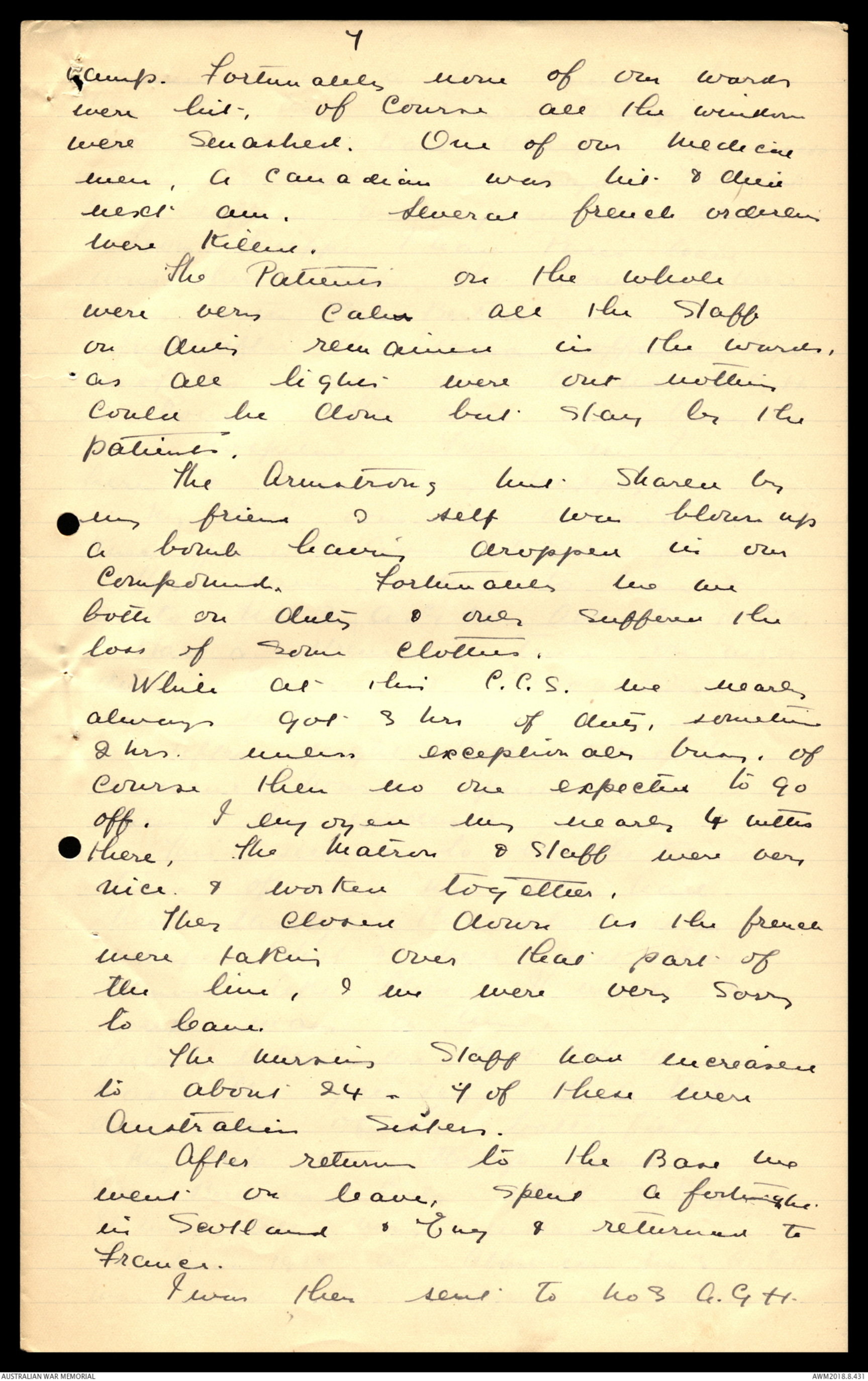
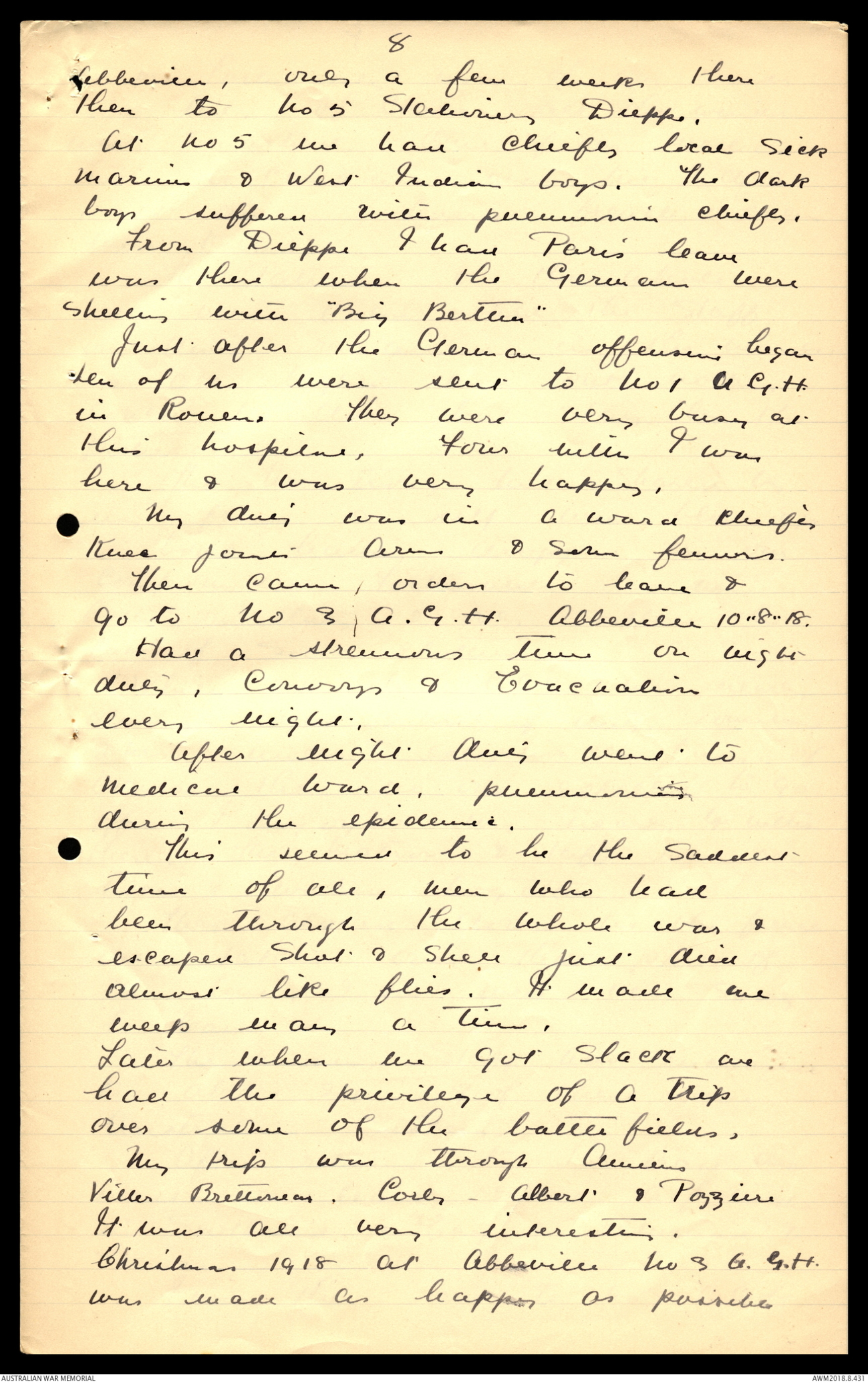
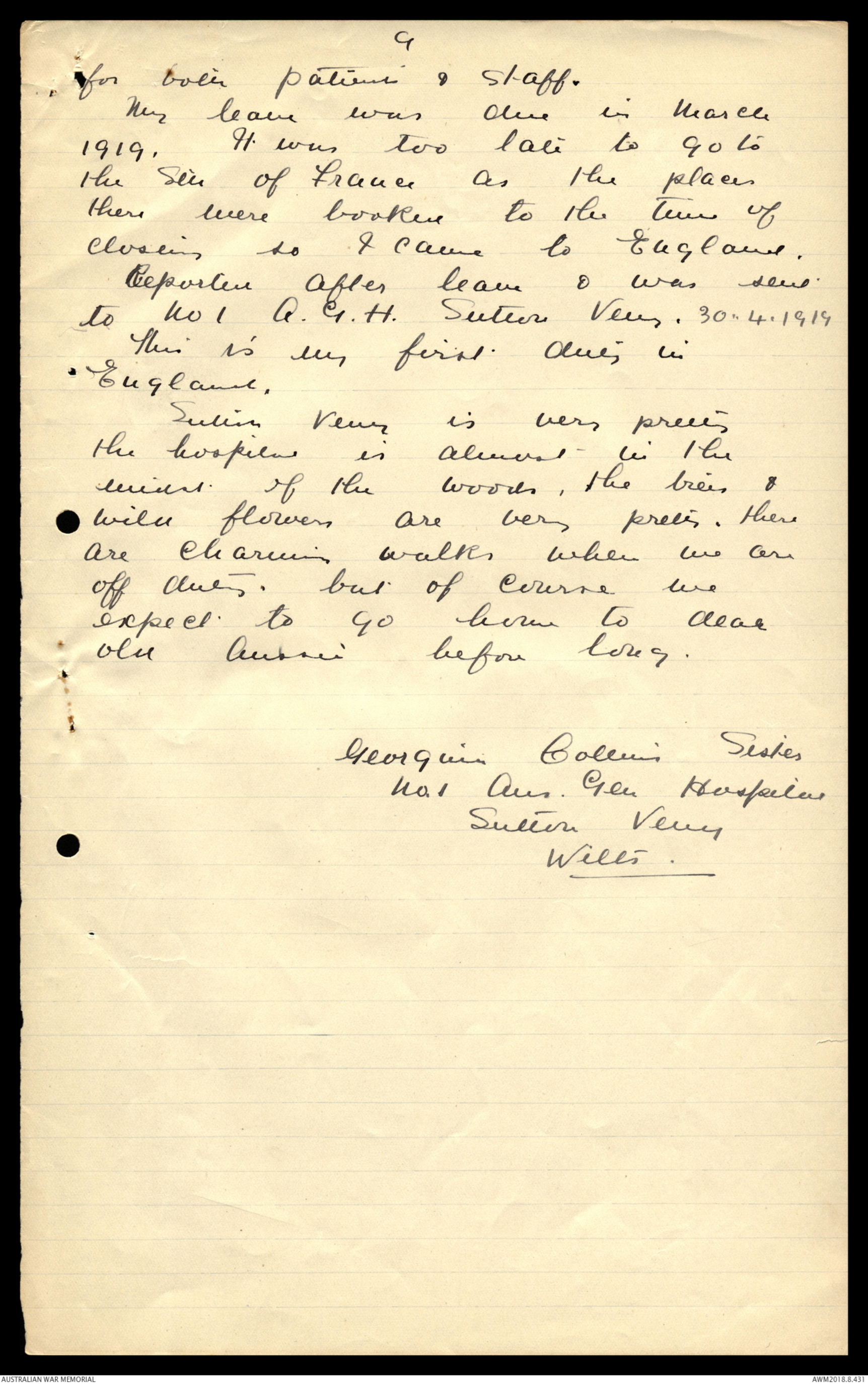
AWM 4 1 5/69
AWM 4 1
AUSTRALIAN ARCHIVES
ACCESS STATUS
OPEN
SISTER G. COLLINS.
[955]
Egypt
France Sr G. Collins 53/32
Nov 1915 "Orsova" 108 sisters
at Cairo divided between
No 1 and No 2 A.G.H
To 27th British General, Abbassia
splendidly kept and infanize
dysentry cases.
France 25th British Ser
Regular time off duty always
given.
At C.C.S Zuydcoote, July 1917
fearful bombing.
Liked working with British
sisters.
The Offical War Historian of the Commonwealth
Government (Dr. C. E. W. Bean), after his study of the
collection of private war records preserved in the Australian
War Memorial Library, wrote:-
"The private diaries in this collection furnish some of its most
valuable historical records, but, like all private memoirs which were
not compiled with any historical purpose, they should not be
regarded as first-hand evidence except where it is certain that they
are so. The diarist is almost always sincere in his desire to record
accurately, but he is subject to no obligation or inducement to
indicate whether he is recording his own observations or incidents
told him by friends or heard at third or fourth hand at the mess-table.
Thus, in some of the diaries in this collection, scenes described with
vivid detail, and without any warning that they are told at second
or third hand, have been found to be completely inaccurate in
important details.A certain number also have been written up
or revised long after the events, though doubtless usually from notes
made at the time. In most cases the student must rely on his
experience and on internal evidence to guide him in judging what is
and what is not likely to be historically accurate".
[*53/32*]
[*CCS [?elt..]*] [*Collins*] Egypt 12.11.15 - 16.1.17 France 8.2.17 - 30.4.19
[*53/32*]
1
With a number of other Sisters
numbering about 108 I sailed from
Melbourne on the "Orsova Nov. 12th 1915
Our trip was uneventful as
we only called at Freemantle & Aden
for coal.
We reached Suez on Dec. 9th 1915
journeyed to Cairo the same day.
We were divided, some being
sent to No 1 A.G.H & some to No 2
A.G.H.
I was sent to No 1 at Heliopolis
& remained there until it closed
on March 29th 1916. Then reported for
duty to Luna Park.
My first ward was the "Joy Wheel"
evidently intended as "open air treatment"
for septic cases, as there were old
septic wounds.
These patients were evacuatees
to Australia & my next ward
was the Gallery of the Skating rink.
Our patients here were all convalescers
waiting to return home.
While at this hospital there was
an opportunity given of a trip
to Luxor, with 10 other Sisters I
availed myself of it & thought
it well worth while.
When Luna Park closed I was
sent to No 27 British Gen al
Abbassia.
This hospital was the cleanest
& most perfectly kept one I ever
saw. The O.C did a round of
2
inspection every evening between 6 & 7pm.
& woe betide any one whose ward
was untidy or had a speck of
dust or grease spot in it.
My duties were in the dysentery
ward, the cases were acute, but
made good recoveries, we had one
death in the ward the 4 weeks
I was there.
Careful attention was paid to
the diets, there was a V.G.D Kitchen
where any little extras required
were made.
Our time off duty at this hospital
was 3 hrs a day one 1/2 day a week
& one whole day a mth, as I was
there only 4 weeks I did not get
the day.
Just about this time there was
some fighting down the Canal & all
Australian sisters at the British
hospital were recalled to No 3 A.G.H
At this hospital I did 5 weeks night
duty in a surgical ward, The work
was very interesting but the patients
were soon evacuated , those that
were left recoved very quickly.
Then No 3 closed & left for Eleq.
This time I was sent to Choubra
infectious hospital. Four mths I spent
at this hospital, nearly all the
sisters left Aus. on the same boat
as myself, so we knew each other
fairly well & were very happy together.
We were not what you would called
rushed with work, with the
exception of a few weeks, I was on
3
duty in the diphtheria ward, here we
were kept going, there were also a
lot of cases of Tonsilitis.
From Choubra we all had a weeks
leave to Alexandria & enjoyed the
sea breezes & bathing. After the sand
& heat of Cairo.
Xmas at Choubra was much enjoyed
every one united to make it as
happy a time as possible for all.
At this time there were constant
rumours of our leaving Egypt &
on 16..1..17 it became a reality
for that morning we, 26 of the Staff
left Cairo for Alexandria on a
hospital train, Tea & Sandwiches
were provided on the train.
It was goodbye to the east with
it's Pyramids, Sphinx, Nile, Donkeys
Buffalos & Camels, we almost felt
sad at the thought of not seeing
them again, much as we
longed for England & France.
At Alexandria we boarded the
hospital ship 'Essiquibo"
We sighted Malta in the
distance, got glympses of the
Sth. coast of France anchored out
for 3/4 hr. off Gibraltar, the coast
of Spain was interesting, especially
Trafalga Bay. We saw the destroyers
patroling along the coast as we passed.
In 10 days time we landed
at Southampton & were soon in
London. After some days in London
getting our camp kits & warm clothes
we left for France, arrived 8.2.17
4
Here we were sent to the British
Hospitals - with three other sisters
I was sent to 25th Gen. at Hardelot.
We left Boulogne by Ambulance &
appeared to be travelling over endless
miles of snow, in reality it was
about 9 miles.
This hospital was chiefly under
canvas & was very close to the
sea in fact in the sand -hills
Consequently we got the sea
breezes with a vengeance & they
were bitterly cold just then.
The Marquees were used for
skin cases & the work was trying
in the extreme under the conditions
of such cold & lack of heating.
The road to Hardelot was so
bad that it was difficult at
times to bring coal all the way
out. In the dressing tents we
had braziers, which were beautiful
for warming but the fumes were
very disagreeable.
At this time the staff were
all imperial sisters, the hrs off
duty were the usual in British
hospitals regular time was always
given.
While here I have the misfortune
to get sick & was sent to the
Chateau Maricieu at Wimmereaux
Sick leave to Eng. followed spent
at "Glen Almond" St Albans.
I cannot speak highly enough of
the comfort of this place & many thanks
are due to Mr McIlwraith for lending
5
this beautiful home for convalescent
Aus. Sisters.
After 3 weeks I returned to Hardelot
some weeks after this the nursing
staff was changed. Australian
Matron & Sisters took over from
the Imperials.
After 5 weeks at No 25 Gen. order
came for 36 C.C.S British.
My friend & I had been together
since leaving Australia & I have
to thank the different Matrons under
whom I have worked for this.
Together we left for C.C.S where
we arrived on July 30th 1917.
This C.C.S was at Zuydcoote about
10 miles north of Dunkirk on the
coast. At this place there is a
large Sanatorium for tubercular
children. It is facing the Sea &
has a promenade the length of the
building built up on the sand.
The french occupied the greater
part of this building as a General
hospital.
The C.C.S. occupied three large
pavilions & another wing with a
hall & bath & shower rooms.
Apart from these we had the
usual huts used in C.G. Stations. Our The first few days we spent
in equipping the wards.
Our first patients were bombing
casualties, they were very dreadfull,
then the C.C.S's further advanced
were shelled & we had to take
their patients - We evacuated very
6
quickly. Then we got patients direct
from the line as all the allies
C.C.S's had moved back.
I was on duty in one of the
pavillions, It was used as a post
operative ward. There were 95 beds
in it. The ward was well equipped
we had four dressing trolleys
going all the time. We started
with 2 sisters but soon increased
the number to 6.
There were plenty of dressings &
red cross comforts - & the food was
good & plentifull.
The cases in this ward were
chiefly penetrating Chests & Abdomens.
The clients responded well to
treatment - they were Aspirative
frequently - Very collapsed cases given
given Sodi Bicarb intravenously
Glucose & Sodi. Bicarb continuously
was given per rectum for 48 hrs, after
operations to all bad cases.
The Air raids were very trying.
Fritz came over every night. Almost
for 3 mths. Dunkirk being So near
we got the benefit of their visits
there, also on their way to England
Often bombs were dropped very
close to us. Once on the railway
siding running into the yard &
again just outside the wall where
the 34 C.C.S. was camped. Killing some
of their men.
Then came one evening when
they visited us in earnest.
About 14 bombs were dropped in the
7
camp. Fortunately none of our wards
were hit, of course all the windows
were smashed. One of our medical
men, a Canadian was hit & died
next am. Several French orderlies
were killed.
The Patients on the whole
were very calm all the Staff
on duty remained in the wards,
as all lights were out nothing
could be done but stay by the
patients.
The Armstrong hut shared by
my friend & self was blown up
a bomb having dropped in our
compound. Fortunately we we
both on duty & only suffered the
loss of some clothes.
While at this C.C.S we nearly
always got 3 hrs of duty, sometimes
2 hrs unless exceptionally busy, of
course then no one expected to go
off. I enjoyed my nearly 4 weeks
there, the Matron & staff were very
nice & worked together.
They closed down as the french
were taking over that part of
the line, & we were very sorry
to leave.
The nursing Staff had increased
to about 24. 7 of these were
Australian Sisters.
After return to the Base we
were on leave, spent a fortnight
in Scotland & Eng & returned to
France.
I was then sent to No 3 A.G.H
8
Abbeville, only a few weeks there
then to No 5 Stationary Dieppe.
At No 5 we had chiefly local sick
Marines & West Indian boys. The dark
boys suffered with pneumonia chiefly.
From Dieppe I had Paris leave
was there when the Germans were
shelling with "Big Bertha"
Just after the German offensive began
ten of us were sent to No 1 A.G.H
in Rouen. They were very busy at
this hospital. Four weeks I was
here & was very happy.
My duty was in a ward chiefly
knee joints arms & some femurs.
Then came orders to leave &
go to No 3 A.G.H Abbeville 10..8..18.
Had a strenuous time on night
duty, Convoys & Evacuation
every night.
After night duty went to
medical ward, pneumonias
during the epidemic.
This seemed to be the saddest
time of all, men who had
been through the whole war &
escaped shot & shell just died
almost like flies. It made me
weep many a time.
Later when we got slack we
had the privilege of a trip
over some of the battlefields.
My trip was through Amiens
Viller Brettoneaux, Corby - Albert & Pozziere
It was all very interesting.
Christmas 1918 at Abbeville No 3 A.G.H
was made as happy as possible
9
for both patients & staff.
My leave was due in March
1919. It was too late to go to
the Sth of France as the places
there were booked to the time of
closing so I came to England.
Reported after leave & was sent
to No 1 A.G.H Sutton Veny. 30..4.1919
This is my first duty in
England.
Sutton Veny is very pretty
the hospital is almost in the
midst of the woods, the trees &
wild flowers are very pretty. There
are charming walks when we are
off duty but of course we
expect to go home to dear
old Aussie before long.
Georgina Collins Sister
No 1 Aus. Gen Hospital
Sutton Veny
Wilts
 Jacqueline Kennedy
Jacqueline KennedyThis transcription item is now locked to you for editing. To release the lock either Save your changes or Cancel.
This lock will be automatically released after 60 minutes of inactivity.